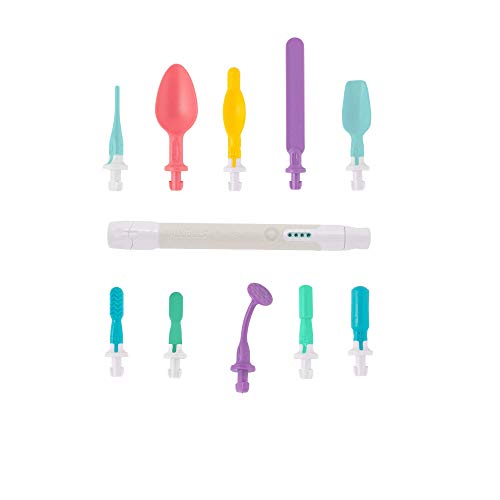A child may exhibit certain developmental or social behaviors that may signal something is wrong, such as head banging and speech delay.
These can be a result of several factors but are generally maintained if you don’t seek treatment. Luckily, you and your child can try plenty of methods to solve these issues.
For that to happen, it would help to learn everything you can about these behaviors. Contacting a pediatrician and running some tests can help point you in the right direction too.
What Is Head Banging?
Head banging, rolling, and body rocking are considered rhythmic behaviors that some children develop out of infancy.
They will go away with age in most cases, so there isn’t much reason to worry. However, it may stick around longer than intended in some rare cases, and treatment will be necessary.
Why Do Children Head Bang?
While there isn’t any scientific explanation, some believe that the motion may be relaxing and mimic rocking from a crib or in a mother’s arms. The rocking motion is tied to feelings of pleasure and is generally enjoyed at a young age.
As a child gets older, they connect feelings of pleasure to other activities such as playing, running, and laughing.
Kids who are less stimulated and don’t interact with their environment will be more prone to head banging. The same can be said about blind, deaf, lonely, or bored children.
On the other hand, overwhelmed children may also start head banging because they find the movement relaxing. Some children do it for attention or to show frustration.
Head banging isn’t exactly dangerous, but it can become a problem if it becomes a habit.
What Can Be Done
Children tend to outgrow habits that don’t provide a function. If a younger child is frustrated and attempting to get something, they will head bang until they get what they want.
The key is not to entertain the behavior and instead ignore it. By not rewarding their negative behavior, the child should stop head banging over time.
For children who do it for attention or out of frustration, the best approach is to ignore their behavior.
Instead, focus on replacing the behavior with an appropriate response.
For example, if a child throws a tantrum and starts banging his head, don’t give them what they want.
Wait until the child is done head banging and then ask them politely what they want.
If they respond politely, you can give them what they are looking for. If not, try and explain what type of behavior is acceptable and what isn’t.
What Is Speech Delay?
Also known as Alalia, speech delay is a speech development issue where children struggle to produce words.
It can happen as early as 12 months and can develop any time up to four years old. In rare cases, a child may develop speech development past that age. A handful of signs can help hint at early speech delay, including:
- If a child is not using gestures, pointing, or waving by 12 months
- If a child starts using gestures over vocalizations or struggles to imitate sounds by age 18 months
- If a child can’t understand verbal requests
- If a child can only imitate speech or actions but not phrases or words by age two
- If a child says only sounds or words repeatedly and can’t produce language for immediate needs
- If a two-year-old can’t follow simple instructions
- If a two-year-old develops an unusual tone of voice
What Causes Speech Delay?
Speech delay can occur for several different reasons. Understanding the cause is key to getting the child treatment.
Here is a breakdown of the many possible reasons that can cause a speech impediment:
- Oral Impairment
A verbal impairment can cause speech delays, such as a problem with the tongue, palate, or a short frenulum that limits tongue movement.
- Oral-Motor Problems
Oral motor problems occur when there is a problem in the brain that makes it hard for the child to coordinate their lips, tongue, and jaw.
The result of this is a difficult time pronouncing sounds or feeding problems.
- Hearing Problems
If the child has poor hearing or ear damage, they may develop speech delay.
Another common problem is that if a child has an ear infection, their speech and language may become delayed.
Treatments for Speech Delay
There is only one type of treatment for speech delay: speech therapy.
However, there are also some games that a parent can play at home to help their children learn speech properly.
Speech Therapy
For children with delayed speech, speech therapy consists of either treatment in-home, small group, or at school.
Speech therapy exercises and activities will vary from child to child, mainly because different reasons cause speech delays
Plus, what works for one child may not necessarily help another. Instead, a therapy session will cater to the specific individual rather than having similar all-around treatment
For activities, a child can expect to complete the following:
- Talk and play games that include books, pictures, and other objects to help stimulate language development
- Practice and listen to modeling of correct sounds and syllables
- Use strategies and homework to support either the parent or caregiver to practice at home with the child
How Parents Can Help
The parent or caregiver must interact with children who have speech or language problems at every possible moment.
The reason is that the more a child practices, the less the speech delay will happen.
Parents can help shape their children’s language problems by encouraging certain activities.
Here are a few methods that parents or caregivers can implement to help speech delay:
- Communicate
Focus on talking with the child, singing, and using a wide range of sounds and gestures that are appropriate for their age.
- Read
Read to your child and provide them with age-appropriate read-along books to help encourage kids to sound out words.
- Use Everyday Situations
Throughout the day, talk to your child and sound out the words normally. Doing this will help demonstrate how to say the word and at what pace.
Do it while cooking a meal, cleaning, or doing household chores.
Kits & Books
There are a few kits and books a parent can use and incorporate into the child’s daily routine
Using speech therapy tools and educational toys can help a child practice talking correctly.
TalkTools Sensi Sensory Integration Kit
This kit includes 10 speech therapy tools that can help increase lip, cheek, tongue, and jaw strength.
It also helps improve biting and chewing skills, jaw mobility, and coordination.
When your child has total awareness of how he moves his lips, cheeks, tongue, and jaw, learning how to speak becomes easier.
Create Fun Noun Vocabulary Builder Flash Cards
These cards include 300 educational photos of animals, food, instruments, sports, and more.
You can use these fun cards to help your child learn new words and pronounce them correctly.
Children’s Speech Book by Sharynne McLeod and Elise Baker
This speech book is an evidence-based approach to assessment and intervention
What’s great about it is that it’s available through paperback or kindle.
Head Banging and Speech Delay in Children
Head banging and speech delay are treatable and, if caught early, can be managed before they become too big of an issue.
That’s why it’s crucial to look for symptoms at the early stages. Otherwise, these behaviors can turn into habits and become a lot harder to get rid of.
That said, there are also things a parent can do at home to help discourage non-biological reasons for head banging and delayed speech.
Encouraging healthy responses and correct speech can help a child find alternative methods to these behaviors.
However, if the reasons are biological, it’s best to contact your pediatrician for more information.
Once a parent determines the underlining cause, they can then follow a treatment plan.
If biological, a child may be put through speech therapy, put on medication, or anything else that may help them biologically.
For social skills, children will be put through treatment sessions to be taught appropriate responses and behaviors.




